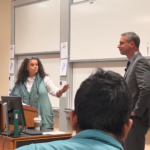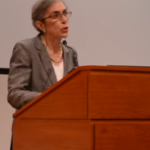Parents Question Court Authority
FAIRFAX, Va.—In response to an outcry from Fairfax County parents who have lost confidence in the public school system’s handling of student disciplinary issues, The Rutherford Institute has made available a letter that parents can use to revoke any and all authority—express or implied—of school administrators and staff to question or otherwise engage in disciplinary measures against their children in their absence. Earlier in the week, John W. Whitehead, president of The Rutherford Institute, called on Dr. Jack D. Dale, superintendent of the Fairfax County Public Schools (FCPS), to reform FCPS’ disciplinary process, voicing the concern that FCPS students and their families are being subjected to inhumane, impersonal and overly harsh administrative hearings. The Institute’s critique followed in the wake of the suicide of Nick Stuban, a sophomore at Woodson High School in Virginia, who took his life on January 20, 2011, after being subjected to what his parents characterized as an “unconscionable” hearing by FCPS officials.
A copy of the FCPS parent form letter and Whitehead’s letter to Dr. Dale demanding disciplinary reform are available online.
“FCPS’ categorical denial of any need for reform in regards to their disciplinary policies and procedures only deepens our concerns about administrators’ commitment to creating a healthy and supportive educational environment for students,” said John W. Whitehead, president of The Rutherford Institute. “Parents have a right to know how and why the system failed Nick Stuban, and what FCPS plans to do to ensure that its deficiencies are corrected so as to avoid yet another such tragedy.”
Under Virginia law, parents are required to participate in certain aspects of the educational process, including cooperating with school administrators in addressing disciplinary concerns when requested to do so. However, reform is needed to ensure that parents are always made aware of their children’s disciplinary infractions. For example, the Virginia Code provision dealing with parental involvement in the educational process states only that the school principal “may” notify parents when their child violates a school board policy that could result in suspension or the filing of a court petition. Believing that such notification should be mandatory, attorneys for The Rutherford Institute have provided parents with a form letter which can be used to insist that they be allowed to be involved in all cases where their children are questioned or otherwise subjected to a school’s discipline process.
Two incidents involving students who committed suicide after being subjected to FCPS’ disciplinary process have prompted parents to take a closer look at deficiencies in the system, especially in regard to the lack of actual due process protections for students, the punitive and demeaning nature of the hearing processes, and the lack of proportionality of punishment to the alleged policy violations. Rutherford Institute attorneys have called for state-wide legal reform, in addition to the adoption of policy amendments by local school boards.
Earlier this month, a bill that would have mandated that parents be notified when their children commit serious policy violations was introduced by Fairfax County’s own Delegate Kay Cory. The bill was defeated by the Virginia Senate in a 28-12 vote. Lobbying organizations for school administrators, including the Virginia Association of School Superintendents and the Virginia School Board Association, vehemently opposed the measure and testified against it in Committee hearings.
Nisha N. Mohammed is the press contact for the Rutherford Institute, a nonprofit legal and educational civil liberties organization which provides legal assistance at no charge to individuals whose constitutional rights have been threatened or violated.




